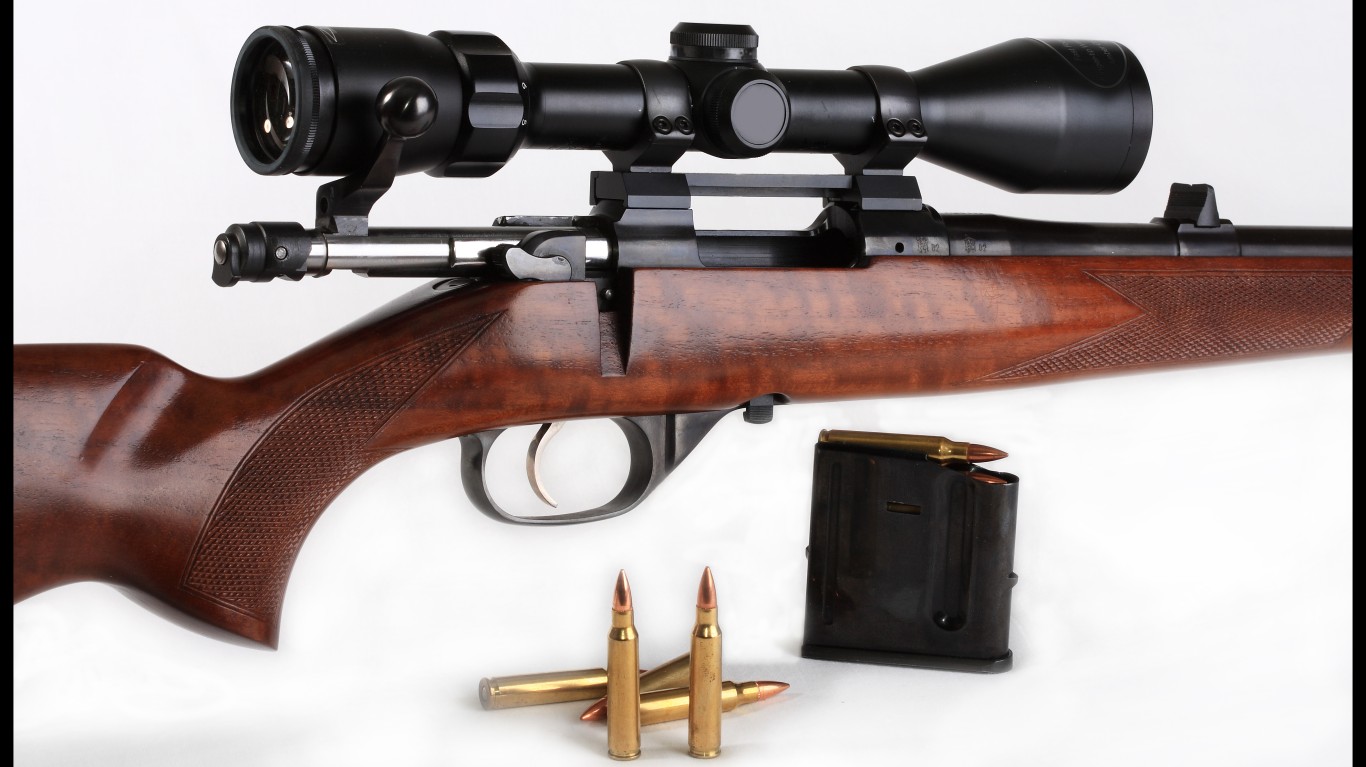
The United States is a large nation, comprised of a total area of more than 3.8 million square miles. It is also an ecologically diverse country, one that has a multitude of geologies, climates, and geographies. With all of this room, it is easy to see how Americans have a fairly wide range of game, both large and small, and as of 2023, there are about 15.9 million hunting license holders who aim to take advantage of all there is to offer.
But simply having a hunting license isn’t enough to ensure you will be successful at the game. There are nearly 16 million hunters in the United States, and most of them know that the ultimate successful hunting trip often depends on their knowledge or understanding of their quarry and most importantly, the weapon needed to complete the task.
Not all rifles are up to the task. The proper hunting rifle can generate enough power to deliver a clean and humane kill – but not so much that nothing is left to harvest after the bullet makes contact. The necessary firepower for such a kill can vary considerably, depending on the prey. (Here is a look at the most powerful hunting rifles.)
Small game like squirrels typically require a bullet that can deliver a minimum of 300 to 500 foot-pounds of energy. Medium-sized game, such as deer, generally need at least 1,000 to 1,200 foot-pounds, and large game like elk and black bear requires over 1,500 foot-pounds. The toughest game, including grizzly bear and moose, may take more than 2,000 or even 3,000 foot-pounds of energy. There may not be such a thing as a “do-it-all rifle,” but some firearms are far more versatile for hunting than others.
24/7 Wall St. identified the most versatile hunting rifle calibers by using ballistic data compiled by outdoor gear retailer Sportsman’s Warehouse. Over 90 different rifle calibers were considered, measuring their capabilities at ranges between 100 and 500 yards in 100-yard increments, while accounting for variations in bullet mass. Rifle chamberings were then ranked with a versatility index score, ranging from 0, the least versatile, to 5, the most versatile.
While the right gun is a matter of personal preference, when it comes to versatility, the numbers speak for themselves. With the proper ammunition, used within a certain range, the highest-ranking rifle chamberings on this list can take game of nearly any size. It should be noted that the index rankings on this list are approximations – they do not account for variations in barrel length and are based on a limited, and not necessarily comprehensive, list of available bullet weights.
Hunting laws vary by state and municipality, and in some parts of the country, hunting with a rifle is not permitted. It is always important to be familiar with your quarry and with all local rules and regulations before selecting a firearm for your next hunt. (Here is a look at the most popular hunting destinations in the United States.)
These are the most versatile rifles for big game hunting.
14. .450 Bushmaster
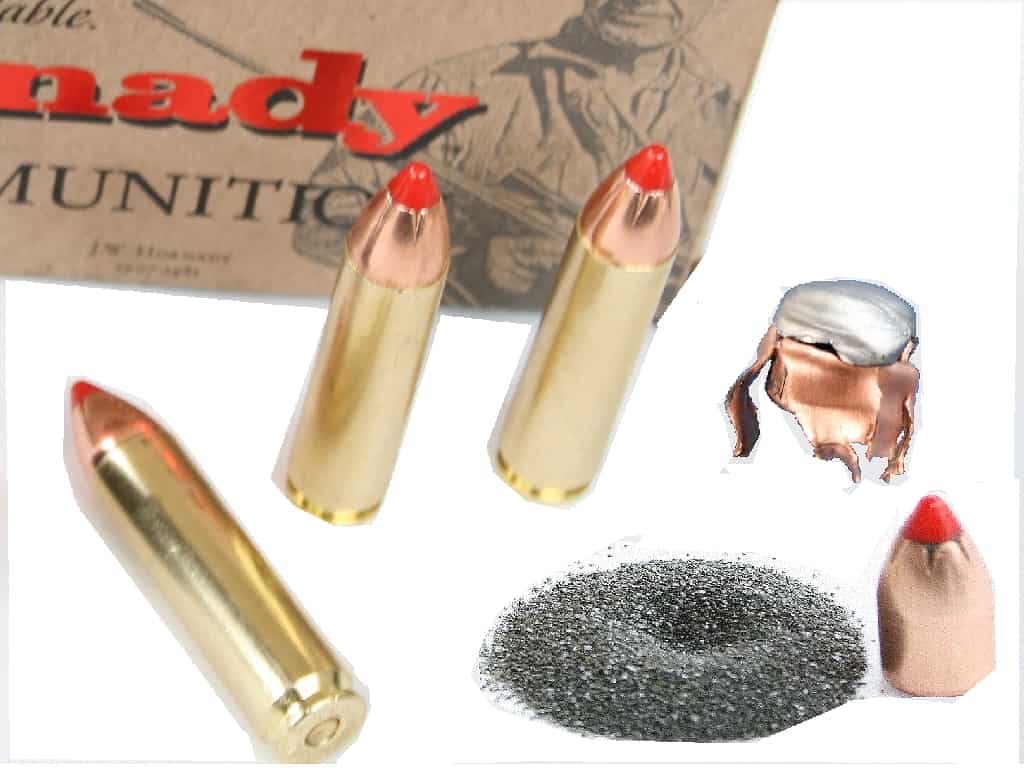
- Performance at 100 yds; depending on bullet mass: 837-1,868 ft./lbs.; suitable for small to large game
- Performance at 300 yds; depending on bullet mass: 662-874 ft./lbs.; suitable for small game
- Performance at 500 yds; depending on bullet mass: Not recommended
First created in 2007, the .450 Bushmaster is one of the newer calibers on this list and has an overall versatility rate of 1.5 out of 5. The cartridge was initially designed for use in semi-automatic rifles and to be capable of taking larger game. However, it is important to note that bullet trajectory begins to drop off rapidly after 200 yards, a factor shooters must account for at longer ranges.
We considered three bullet weights between 245 and 395 grains. With lower-mass, faster-traveling bullets, in 245-250 grain, a .450 Bushmaster can deliver more than enough energy to take large game at 100 yards and beyond. With larger, 395-grain subsonic ammunition, a .450 Bushmaster rifle is also suitable to take smaller game.
13. 7mm Remington Magnum
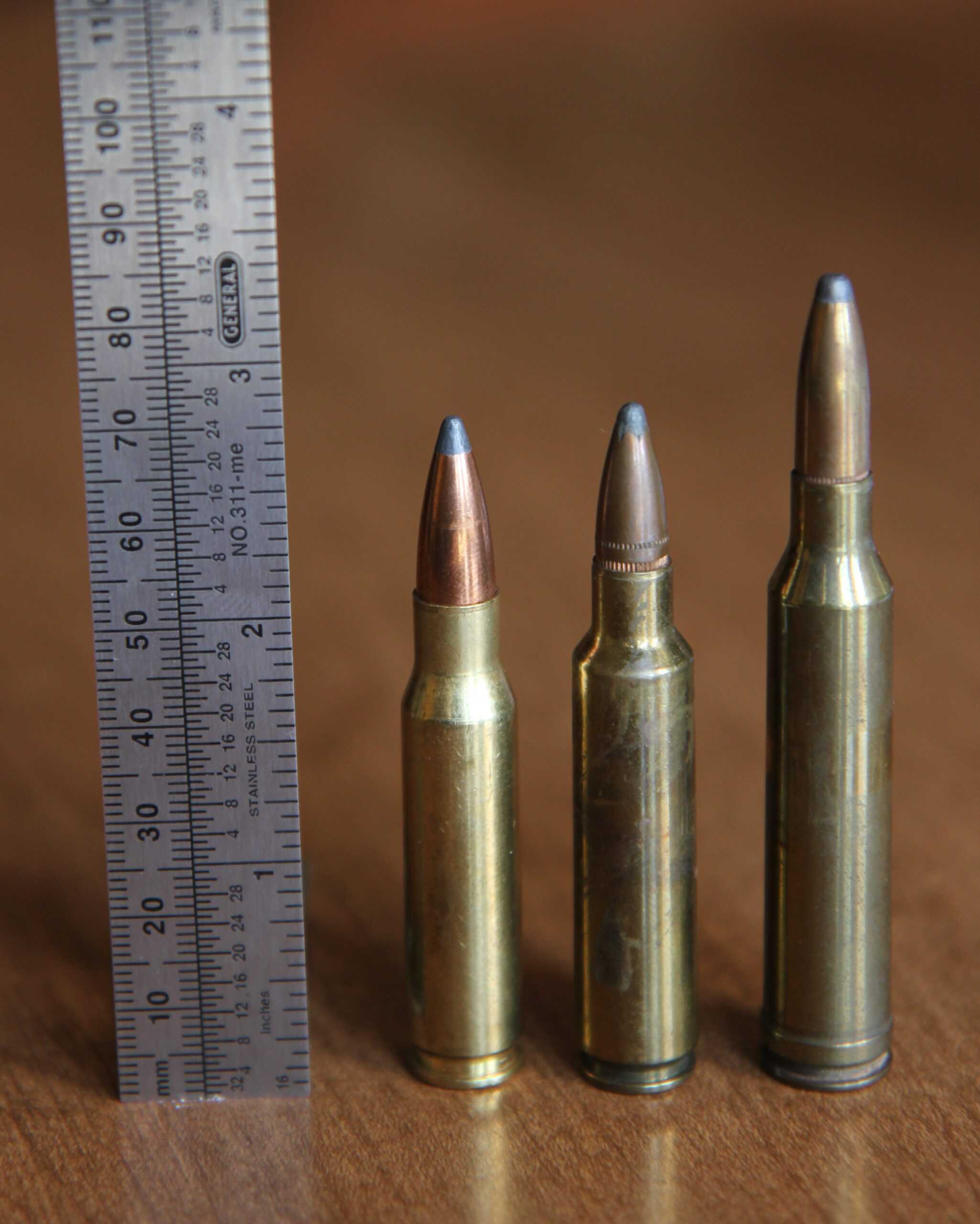
- Performance at 100 yds; depending on bullet mass: 2,596-2,933 ft./lbs.; suitable for the toughest game
- Performance at 300 yds; depending on bullet mass: 1,970-2,298 ft./lbs.; suitable for large game to the toughest game
- Performance at 500 yds; depending on bullet mass: 1,470-1,775 ft./lbs.; suitable for large game
The 7mm Remington Magnum cartridge is, without question, a big-game round with an overall versatility rate of 1.5 out of 5. 7mm Rem. Mag. rifles are capable of taking some of the largest game in North America at distances of 400 yards or more. We considered three bullet weights between 139 and 162 grains.
When used with lightweight bullets, a 7mm Rem. Mag. need not necessarily be ruled out for varmints and predators like prairie dogs or coyotes – though there are certainly many better caliber options for such game.
12. .243 Winchester
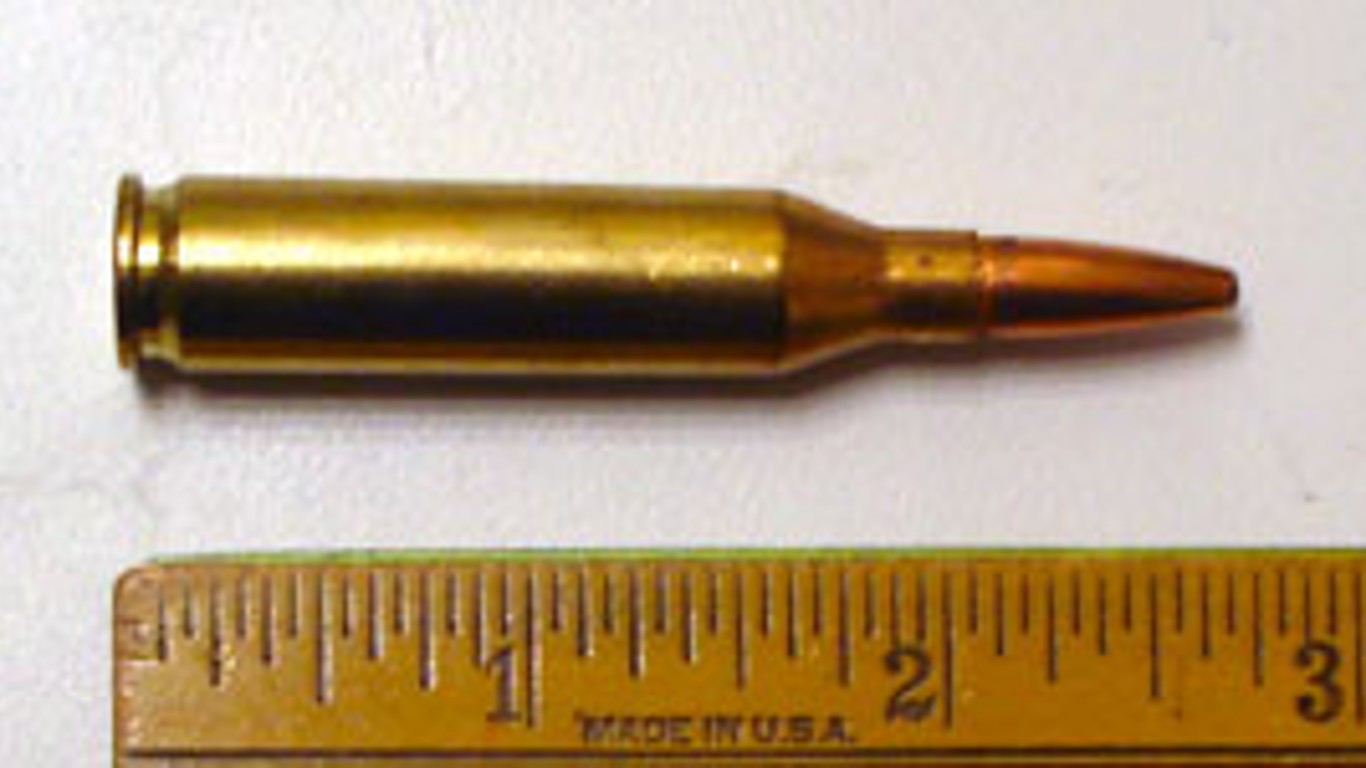
- Performance at 100 yds; depending on bullet mass: 1,280-1,784 ft./lbs.; suitable for medium to large game
- Performance at 300 yds; depending on bullet mass: 897-1,219 ft./lbs.; suitable for small to medium game
- Performance at 500 yds; depending on bullet mass: 520-812 ft./lbs.; suitable for small to medium game
The .243 Winchester is one of the most versatile rifle calibers with an overall versatility score of 1.7 out of 5. Though the .243 may be insufficient to take some of the largest North American game, like elk, in many states, it is the minimum legal caliber for big game hunting.
We considered six bullet weights between 58 and 100 grains. With low recoil and a flat trajectory, the .243 is a popular rifle for deer and varmint hunting. Considering six different bullet masses, from 58 to 100 grain, the .243 is suitable for taking game weighing from less than 100 pounds to more than 1,500 pounds, at a range of 100 yards.
11. 7mm Winchester Short Magnum
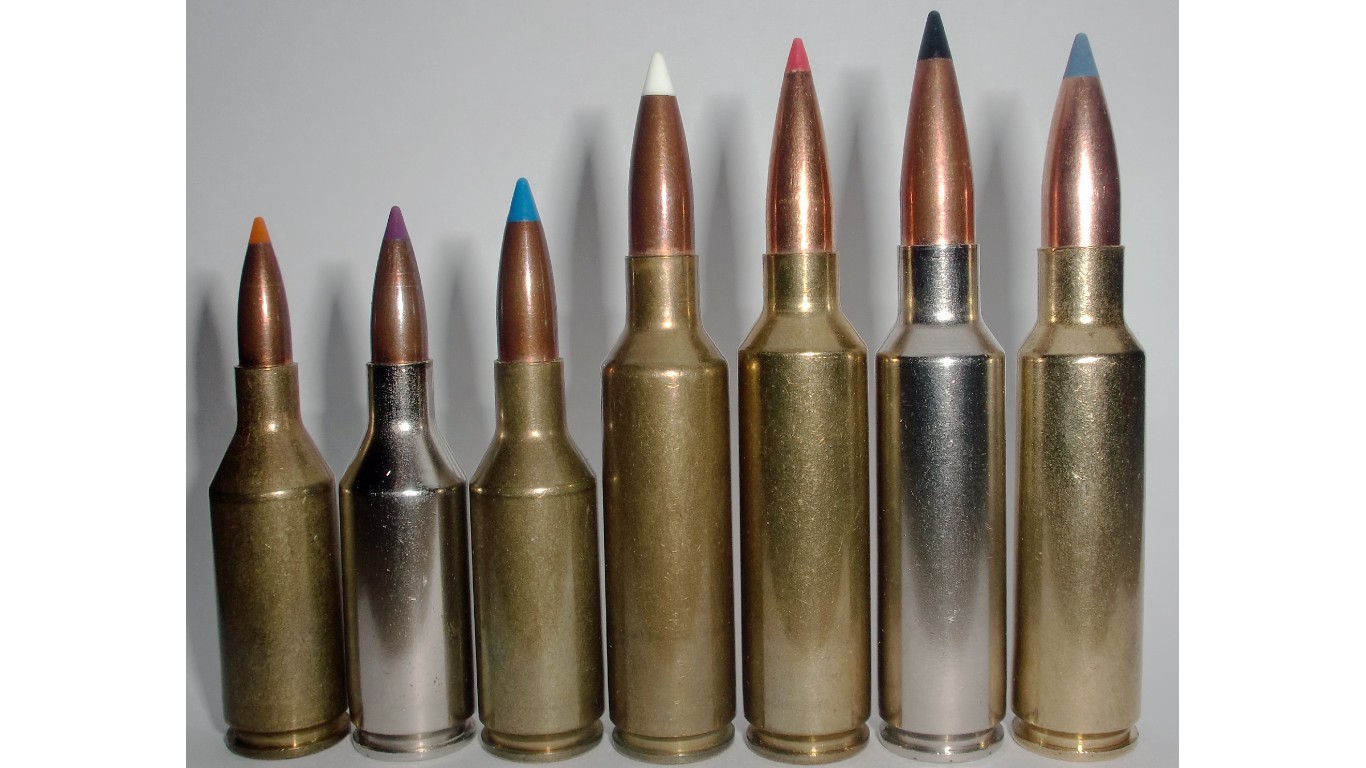
- Performance at 100 yds; depending on bullet mass: 2,489-2,918 ft./lbs.; suitable for the toughest game
- Performance at 300 yds; depending on bullet mass: 1,862-2,358 ft./lbs.; suitable for large game to the toughest game
- Performance at 500 yds; depending on bullet mass: 1,366-1,886 ft./lbs.; suitable for medium to large game
Introduced in the early 2000s, the 7mm Winchester Short Magnum is a relatively new round with an overall versatility score of 2.0 out of 5. We considered two bullet weights between 150 and 162 grains. Used around the world for hunting large game to the toughest game, the 7mm WSM can also be used for medium-sized game at longer ranges.
10. .25-06 Remington
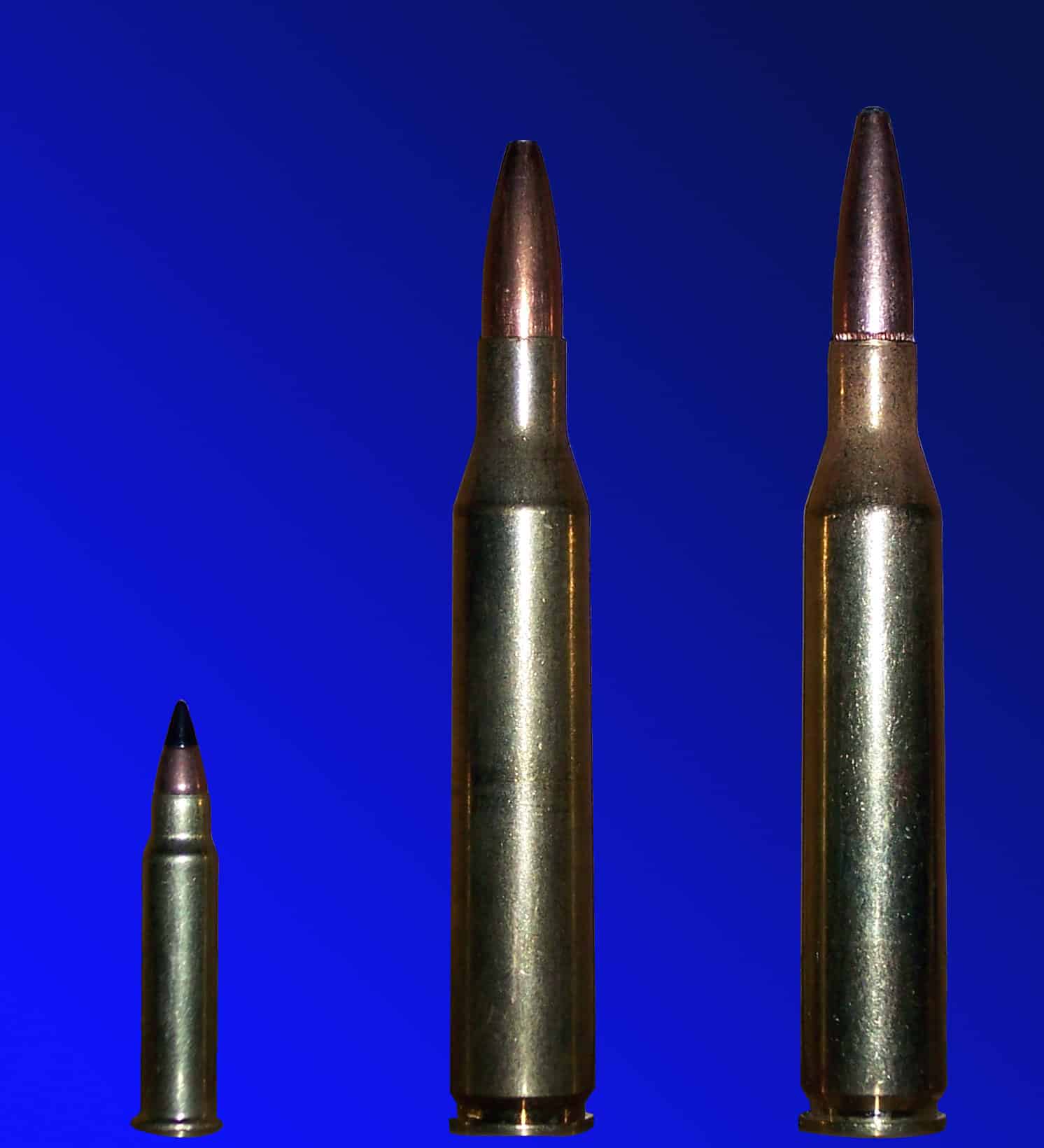
- Performance at 100 yds; depending on bullet mass: 1,690-2,127 ft./lbs.; suitable for large game to the toughest game
- Performance at 300 yds; depending on bullet mass: 1,053-1,502 ft./lbs.; suitable for medium to large game
- Performance at 500 yds; depending on bullet mass: 623-1,031 ft./lbs.; suitable for small to medium game
A versatile chamber with a relatively light recoil, the .25-06 Remington is an ideal deer rifle for many American hunters and has an overall versatility score of 2.0 out of 5. With a 117-grain bullet, a .25-06 can effectively take the toughest game at 100 yards, and large and medium game at 300 and 400 yards.
We considered two bullet weights between 90 and 117 grains. It should be noted that though we did not consider 25-06 bullets lighter than 90 grain in this analysis, 75-grain bullets are available in the .25-06 caliber and can be used for smaller game at longer ranges.
9. .45-70 Government
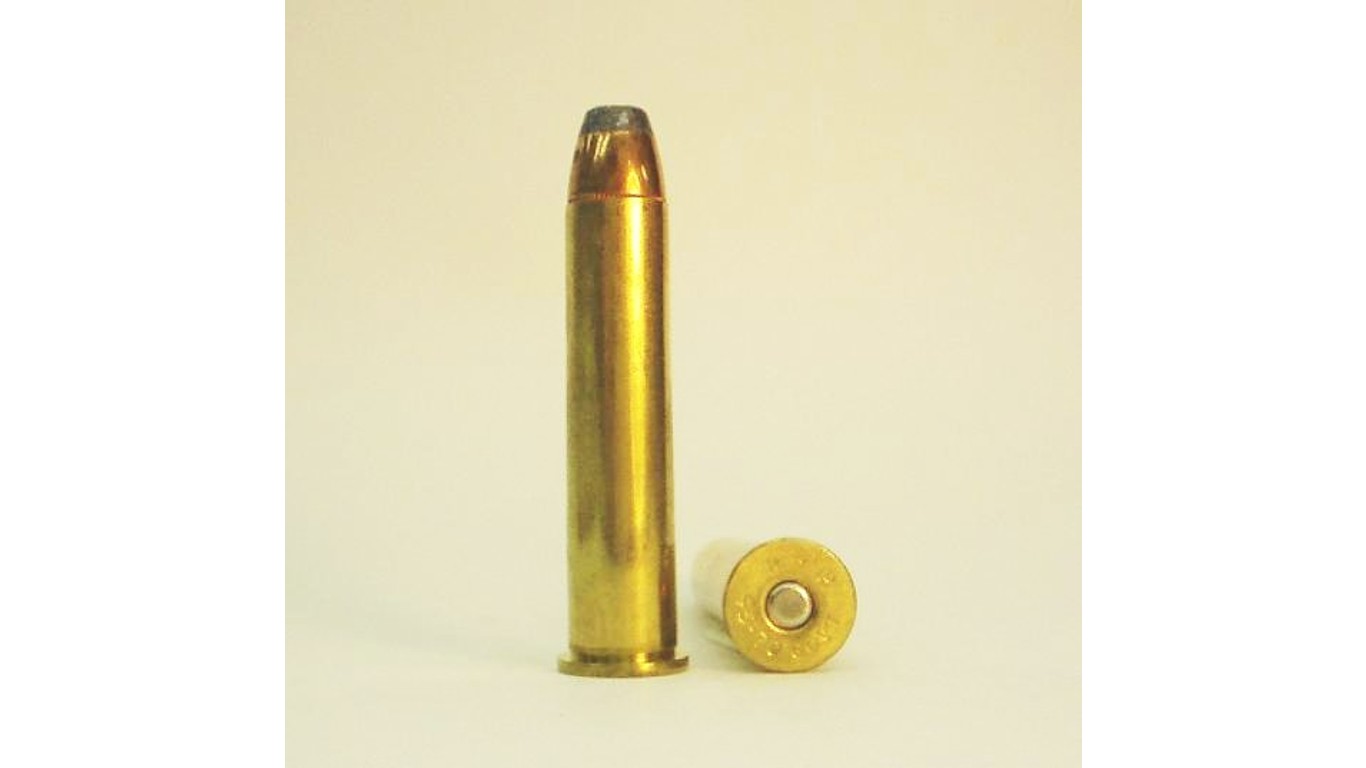
- Performance at 100 yds; depending on bullet mass: 895-2,158 ft./lbs.; suitable for small game to the toughest game
- Performance at 300 yds; depending on bullet mass: 636-1,083 ft./lbs.; suitable for small to medium game
- Performance at 500 yds; depending on bullet mass: Not recommended
An old cartridge, .45-70 caliber guns were popular with hunters as far back as the 1800s. With an overall versatility score of 2.1 out of 5, rifles chambered for .45-70 caliber rounds are capable of firing large rounds, with masses up to 500 grains – but for this analysis, we only considered three bullet weights of 250, 325, and 410-grain bullets.
While larger bullets often do not travel as fast as smaller ones, their mass can compensate for the lower velocities upon impact. With a 325-grain bullet, a .45-70 caliber rifle can take some of the toughest game at 100 yards. When loaded with a 410-grain bullet, the rifle can take smaller game at 200 and 300 yards, though longer-range shots are difficult and not necessarily recommended with this caliber.
8. .300 Winchester Magnum
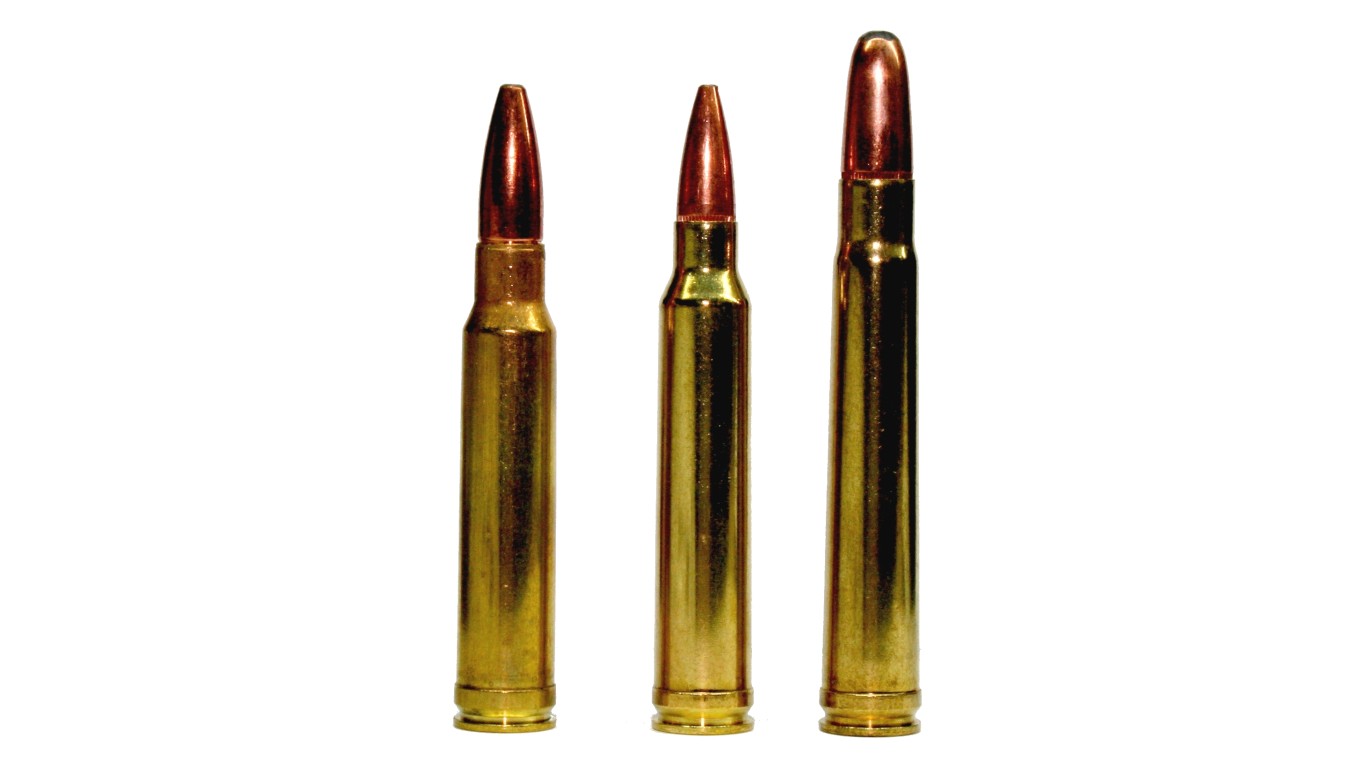
- Performance at 100 yds; depending on bullet mass: 2,973-3,297 ft./lbs.; suitable for the toughest game
- Performance at 300 yds; depending on bullet mass: 2,026-2,587 ft./lbs.; suitable for the toughest game
- Performance at 500 yds; depending on bullet mass: 1,333-2,033 ft./lbs.; suitable for medium to large game
The .300 Winchester Magnum is one of the most popular hunting calibers in North America – and also among the most versatile with an overall versatility score of 2.6 out of 5. Though notorious for having heavy recoil, a .300 Win. Mag. rifle can take on virtually any large game on the continent, including elk, moose, and bear.
We considered five bullet weights between 150 and 200 grains. Deer hunters carrying a .300 Win. Mag. should stick to longer-range shots with lower-grain ammunition. Those looking to hunt small game would be well advised to use a different, smaller caliber rifle.
7. .376 Steyr
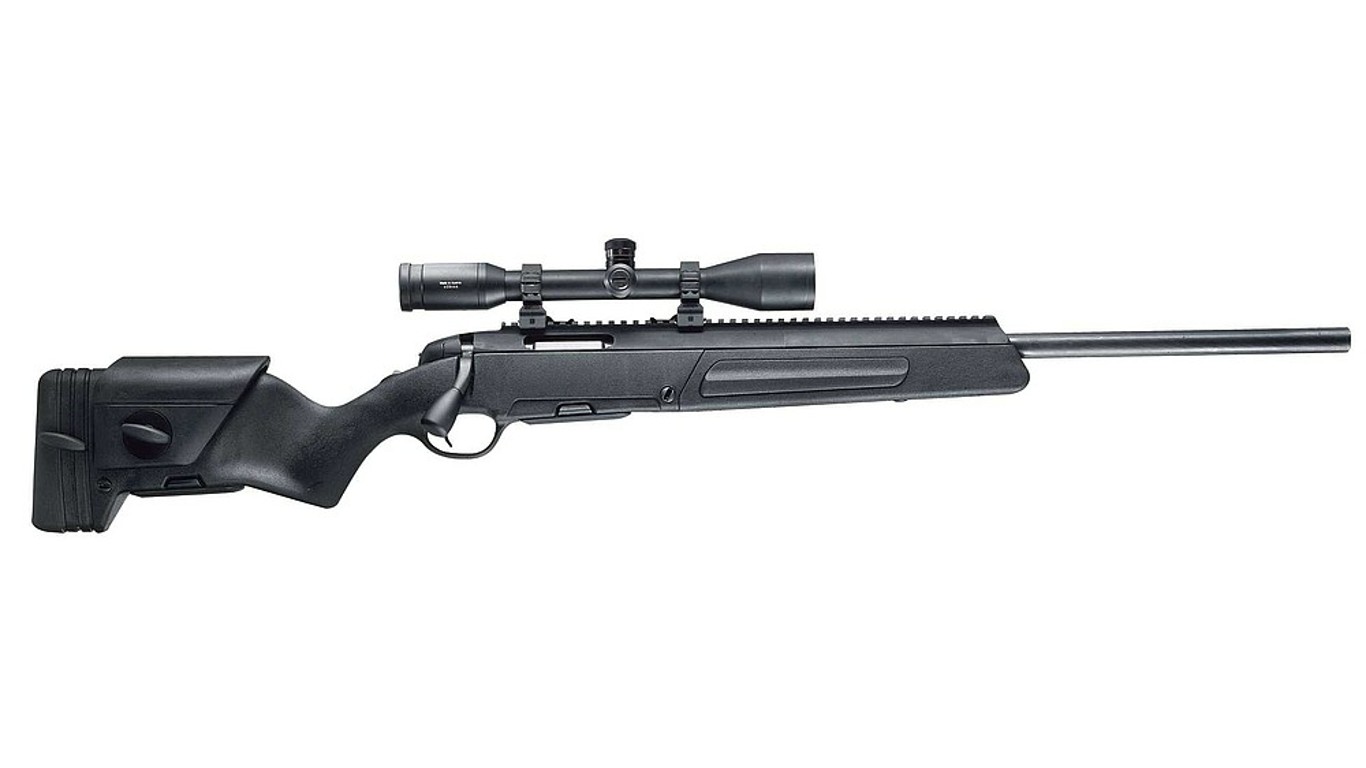
- Performance at 100 yds; depending on bullet mass: 2,714-3,373 ft./lbs.; suitable for the toughest game
- Performance at 300 yds; depending on bullet mass: 1,694-2,283 ft./lbs.; suitable for large game to the toughest game
- Performance at 500 yds; depending on bullet mass: 1,023-1,500 ft./lbs.; suitable for medium to large game
With an overall versatility score of 2.7 out of 5, the .376 Steyr caliber round, introduced in 1999, was specifically designed for versatility. We considered two bullet weights, the 225 and 270 grains. At 100 yards, a 270-grain bullet can take the toughest game in North America and even large African game, while a 225-grain bullet is well suited for medium-sized game at 400 and 500 yards.
6. .375 Ruger
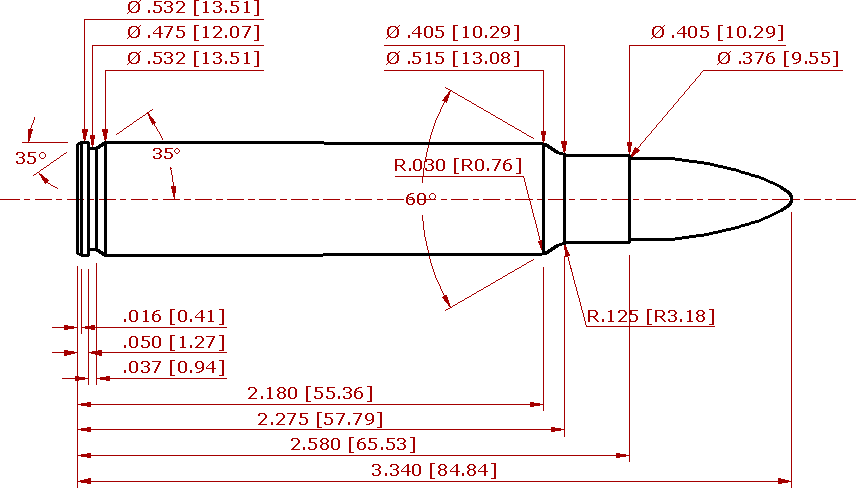
- Performance at 100 yds; depending on bullet mass: 3,660-4,052 ft./lbs.; suitable for the toughest game
- Performance at 300 yds; depending on bullet mass: 2,110-2,786 ft./lbs.; suitable for the toughest game
- Performance at 500 yds; depending on bullet mass: 1,174-1,880 ft./lbs.; suitable for medium to large game
With an overall versatility score of 2.9 out of 5, it is perhaps not among the most popular rifle calibers, but the .375 Ruger, introduced in 2007, is certainly among the most versatile. Capable of delivering 4,052 foot-pounds of energy at 100 yards with a 270-grain bullet at 100 yards, the .375 Ruger is a contender for the most powerful rifle chamber on this list.
We considered three bullet weights between 250 and 300 grains. At 300 and even 400 yards, it is still suitable for some of the toughest game in North America. And with a slower 300-grain bullet, the .375 Ruger is also a reasonable choice for taking medium-sized game beyond 400 yards.
5. 7mm-08 Remington
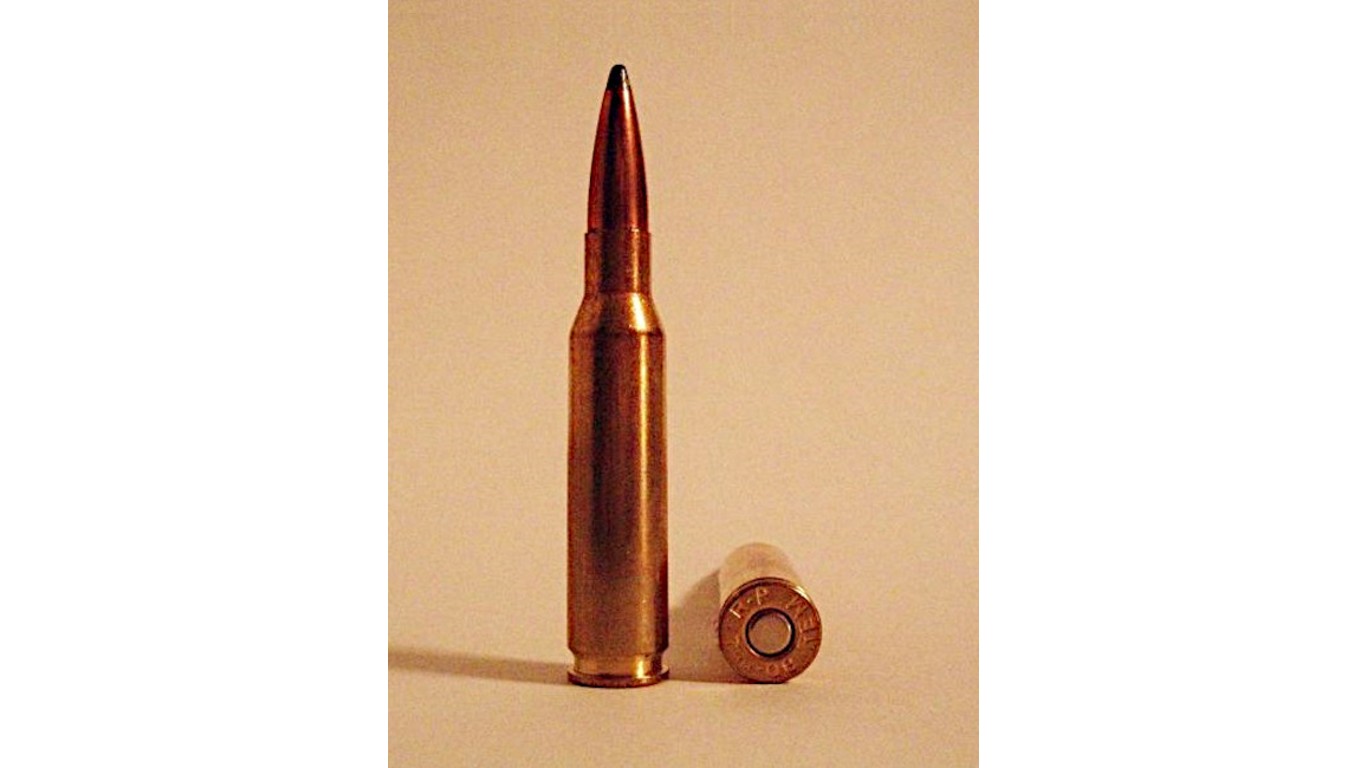
- Performance at 100 yds; depending on bullet mass: 1,579-2,274 ft./lbs.; suitable for large game to the toughest game
- Performance at 300 yds; depending on bullet mass: 1,057-1,784 ft./lbs.; suitable for medium to large game
- Performance at 500 yds; depending on bullet mass: 685-1,381 ft./lbs.; suitable for small to medium game
The 7mm-08 Remington is effectively a .308 Winchester round necked down to hold 7mm bullets and has an overall versatility score of 3.3 out of 5. Though less popular than the .308, the 7mm-08 offers shooters a lighter rifle with lower recoil. We considered three bullet weights between 120 and 150 grains. Rifles chambered in 7mm-08 are capable of taking some of the largest North American game, including moose and bear, as well as smaller game like deer and hogs. The rifle is also capable of taking most game on African plains.
4. .375 H & H Magnum
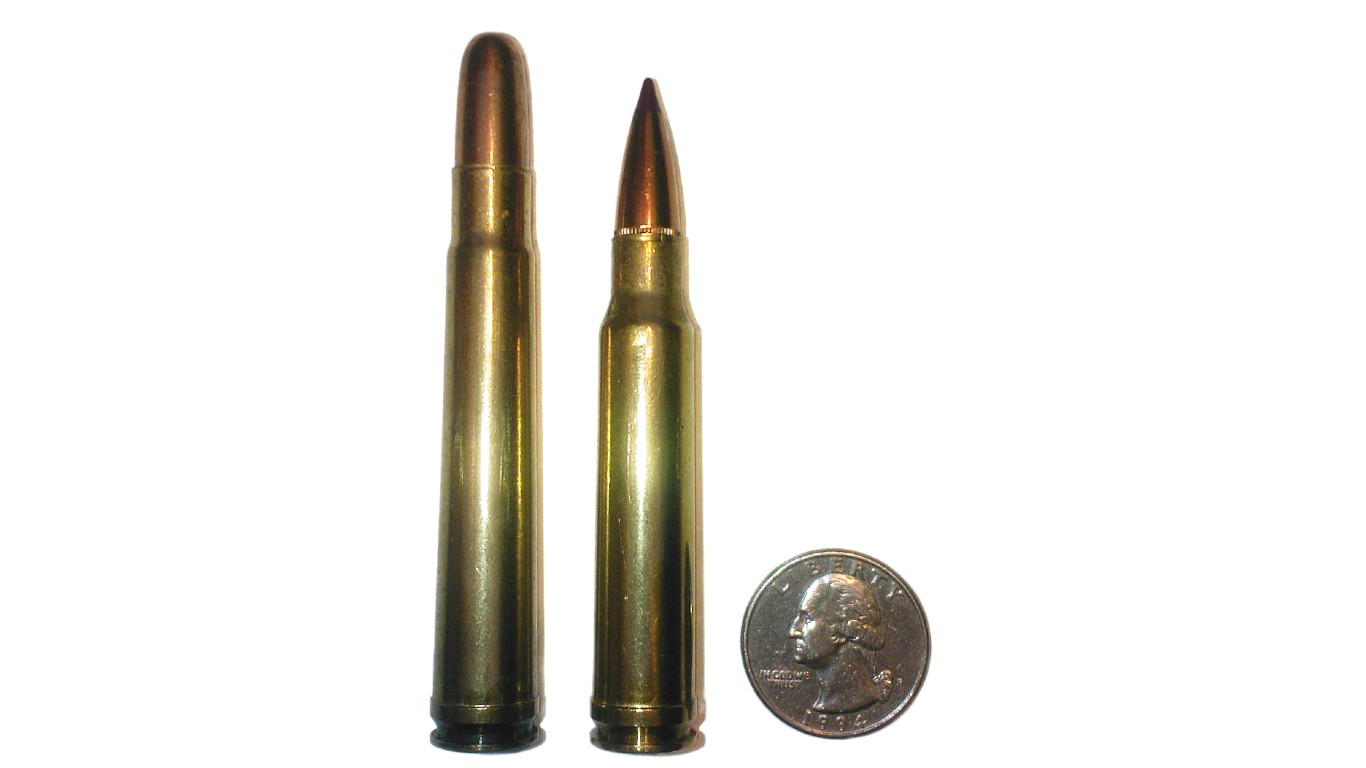
- Performance at 100 yds; depending on bullet mass: 3,292-3,935 ft./lbs.; suitable for the toughest game
- Performance at 300 yds; depending on bullet mass: 1,875-2,699 ft./lbs.; suitable for large game to the toughest game
- Performance at 500 yds; depending on bullet mass: 1,050-1,793 ft./lbs.; suitable for medium to large game
A 110-year-old round, the .375 H & H Magnum was introduced by British gunmaker Holland & Holland in 1912 and has an overall versatility score of 3.5 out of 5. Three bullet weights were considered, between 250 and 300 grains. Suitable for some of the largest African game, it is one of the most popular rifle chambers in Africa. A .375 H&H Magnum rifle is also versatile and capable of taking large and medium-sized North American game with slower 300-grain bullets.
3. .308 Winchester
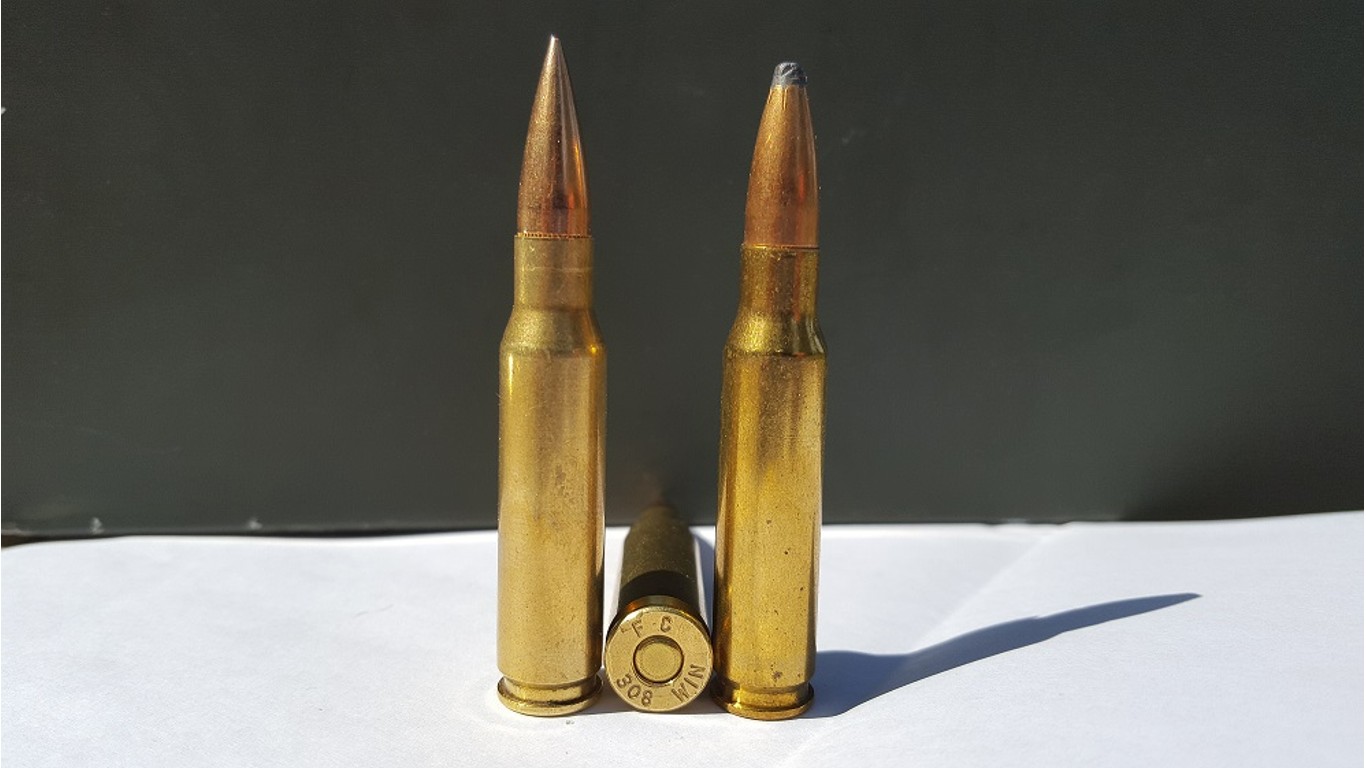
- Performance at 100 yds; depending on bullet mass: 1,584-2,455 ft./lbs.; suitable for large game to the toughest game
- Performance at 300 yds; depending on bullet mass: 971-1,821 ft./lbs.; suitable for small to large game
- Performance at 500 yds; depending on bullet mass: 573-1,364 ft./lbs.; suitable for small to medium game
The .308 Winchester is a time-tested caliber that remains popular 70 years after it was introduced and has an overall versatility score of 3.9 out of 5. Though many similar and newer rounds have been introduced over the years, the longevity of the .308 is attributable to its capability and versatility.
Six bullet weights were considered between 125 and 178 grains. With smaller, 125-grain ammunition, a .308 is appropriate for taking small game at distances of over 300 yards. And with heavier ammunition, a .308 is well matched for medium-sized game up to the toughest game.
2. .270 Winchester
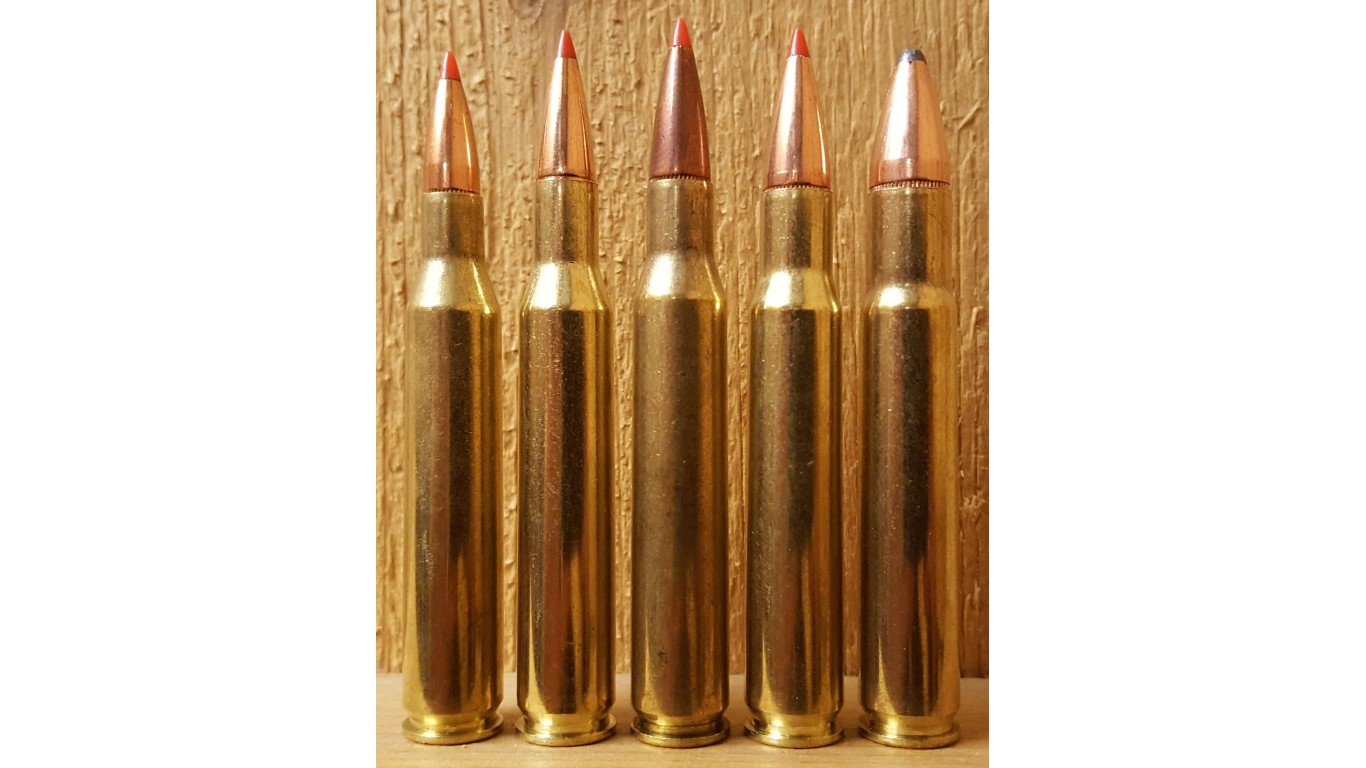
- Performance at 100 yds; depending on bullet mass: 1,605-2,604 ft./lbs.; suitable for large game to the toughest game
- Performance at 300 yds; depending on bullet mass: 1,113-1,986 ft./lbs.; suitable for medium game to the toughest game
- Performance at 500 yds; depending on bullet mass: 751-1,497 ft./lbs.; suitable for small to large game
Originally introduced in the 1920s, the .270 Winchester is one of several cartridges on this list that has stood the test of time. With an overall versatility score of 4.0 out of 5, the .270 has a flat trajectory out to 300 yards and, with the right ammunition, is capable of taking nearly all big North American game.
Five bullet weights were considered from between 120 to 150 grains. With a 150-grain bullet at 400 or more yards, hunters can use a .270 for taking medium game, and with a 120-grain bullet at 400 yards, even small game. As a result, the .270 Winchester is one of the most versatile rifles on the market.
1. .30-06 Springfield
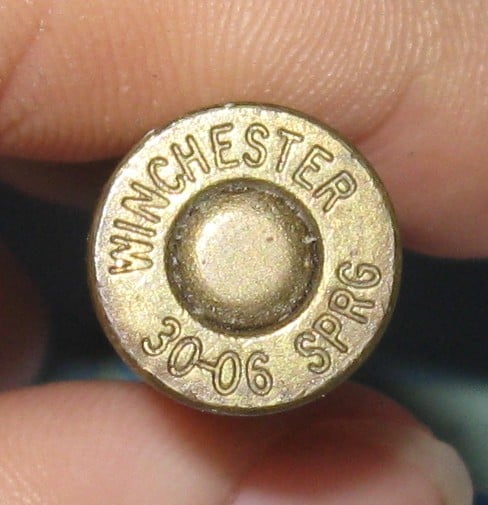
- Performance at 100 yds; depending on bullet mass: 1,615-2,769 ft./lbs.; suitable for large game to the toughest game
- Performance at 300 yds; depending on bullet mass: 993-2,076 ft./lbs.; suitable for small game to the toughest game
- Performance at 500 yds; depending on bullet mass: 587-1,526 ft./lbs.; suitable for small to large game
Since the .30-06 Springfield rifle was introduced over 100 years ago, it has established itself as perhaps the most popular big-game rifle in North America which is evidenced by its high overall versatility score of 4.9 out of 5. Out to 200 yards, with the right ammunition, the gun is more than capable of taking a wide variety of game from deer and antelope up to elk and moose.
Four bullet weights were considered between 125 and 180 grains. While the round’s performance does begin to suffer at longer ranges, with a lighter 125-grain bullet, it can still be effective against smaller game at 300 or more yards. The .30-06 was also used by the U.S. military in World War II.
Want to Retire Early? Start Here (Sponsor)
Want retirement to come a few years earlier than you’d planned? Or are you ready to retire now, but want an extra set of eyes on your finances?
Now you can speak with up to 3 financial experts in your area for FREE. By simply clicking here you can begin to match with financial professionals who can help you build your plan to retire early. And the best part? The first conversation with them is free.
Click here to match with up to 3 financial pros who would be excited to help you make financial decisions.
Thank you for reading! Have some feedback for us?
Contact the 24/7 Wall St. editorial team.